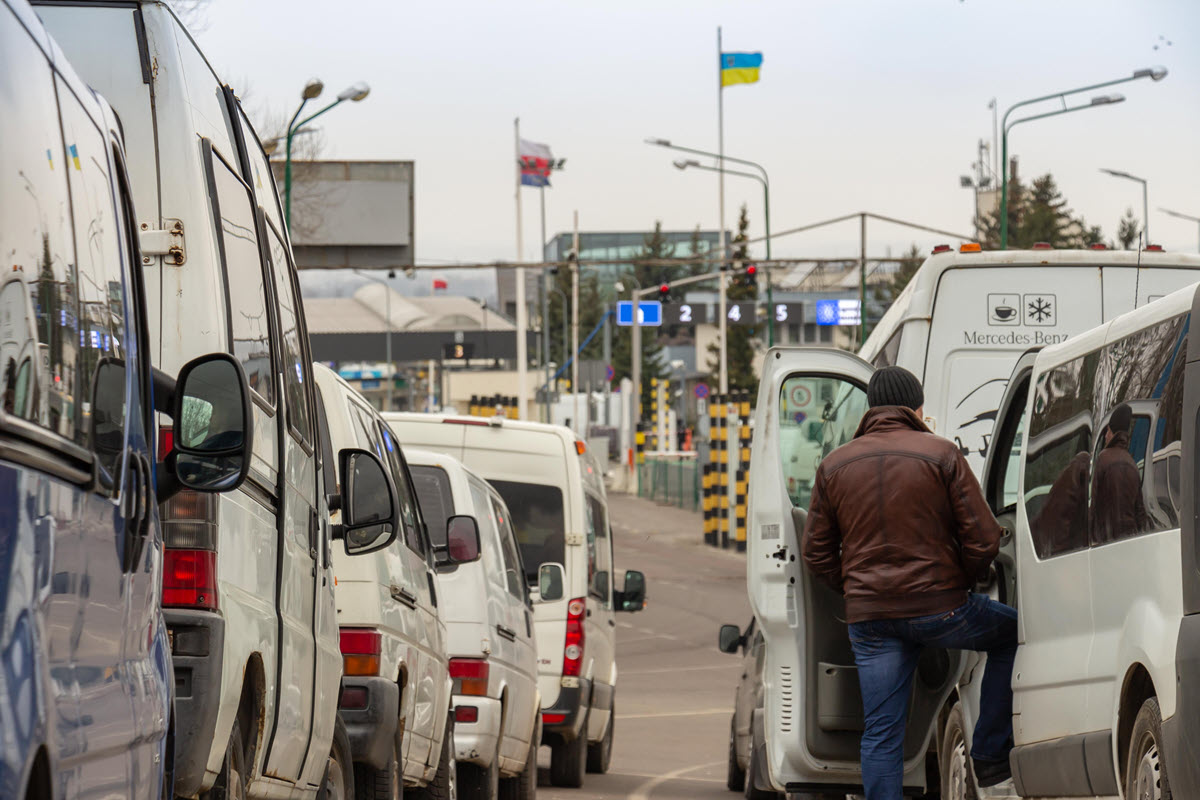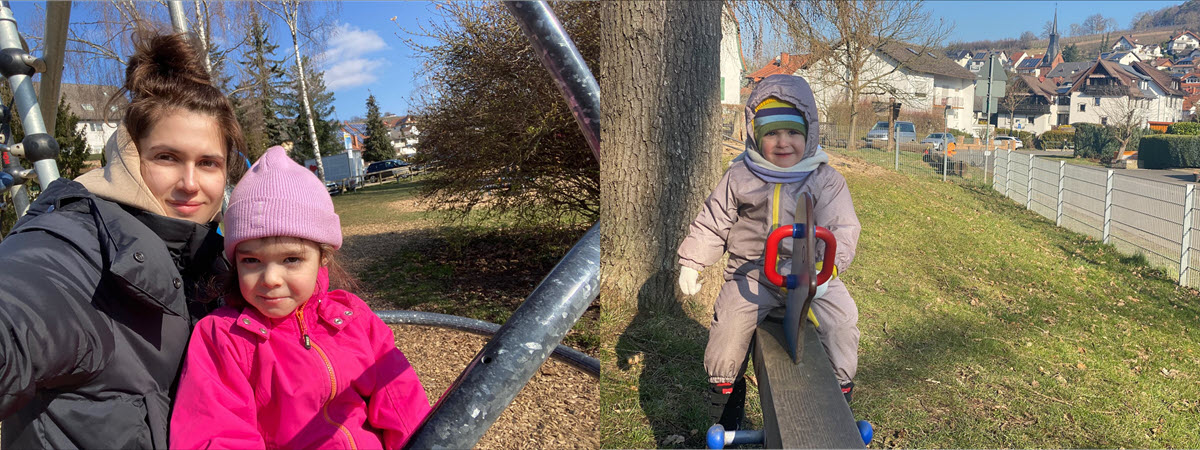We’ve all been shocked and saddened by the war in Ukraine.
But there is a personal side to this story we’d like to share with you.
As part of our remote work program, several of our Formaspace team members are working overseas, including Mehmet Atesoglu, Formaspace Director of Marketing, who has returned home part-time to look after his parents in his native Istanbul, Turkey.
When Russia invaded Ukraine, Mehmet’s thoughts were focused on our graphic designer, Olga, who lived in Kharkiv, in the northeast part of Ukraine, not from the border with Belarus.

Olga reassured us she would be OK. But as a precaution, she had rented a home outside Lviv near the Polish border, just in case Kharkiv came under attack and she needed to evacuate with her husband, two small children, and their little black dog Chocolate Muffin.
Suddenly it was time to act on the evacuation plan. Kharkiv was threatened by attack. Olga was torn; some of her immediate family members, close friends, and neighbors refused to leave. Was it right for her to flee? Looking at her children, she knew she had to protect them, and Lviv seemed the best option in a desperate situation.
For several weeks, Lviv was spared attack while the Russian forces made their way toward the country’s capital Kyiv, Olga’s hometown of Kharkiv, and provinces to the east and south along the Black Sea.
The feeling of safety did not last. Missiles, possibly launched from Russian naval bases in occupied Crimea, attacked the highways in the Lviv area, where refugees were streaming across the border to Poland.
Olga’s husband, like most Ukrainian men, would stay to fight. But looking at her children, she decided to move them further to safety, this time to the Czech Republic. The backup at the border crossing was nerve-wracking, an interminable wait made worse due to constant fear of potential airstrikes. Over a three-day period, she and her husband took turns minding the children away from the border queue just to be sure. But eventually, their turn came to leave Ukraine, and Olga said goodbye to her husband at the border crossing.
Fortune smiled again. Olga did not settle in the Prague region of the Czech Republic as she had planned, for friends of friends offered her a place for her family to stay in Germany, in the financial capital Frankfurt.
Today, Olga is both thankful and fearful. Thankful for the outpourings of help, but also fearful for her family and friends back home in Kharkiv – and most of all, her husband, who has remained behind.
When she calls her relatives in Kharkiv, she hears air raid sirens in the background, but she realizes they don’t even notice it anymore. It’s become normal to them, given that her relatives retreat to the bomb shelter several times a day for hours at a time. Olga realizes, “what was normal for us keeps changing. It’s terrible we have come to accept this as normal now.”
As time has passed, more and more information about the scale of human tragedies and violence has come to light. We discussed a terrifyingly graphic Washington Post photojournalist story uncovering the horror of what has happened in her hometown. Olga responded: “It’s terrible to read this. But it’s true. And the truth is even much worse than it is written. From under the rubble of the regional administration of Kharkiv, they found 24 corpses. On the outskirts of the city, corpses are not taken out to be buried or to the morgue. Many people are buried in the courtyard of their houses. Outside the city, in Tsirkuny, people are sitting in basements and cannot go outside because there are fights. There is no water and food, light and communication. People are dying. My friend could hardly escape from there.”
Olga is lucky, and she knows it. Germany has offered her a temporary visa to continue working, her kids are attending German pre-school, and they are offering food assistance and healthcare.
While her thoughts lie with her relatives, and especially her husband back in Ukraine, she is also trying to make sense of what to do for the future.
Some decisions have been made for her. News recently reached Olga that their house in Kharkiv was heavily damaged in recent fighting, so they no longer have a home to return to.
Over the long term, she would like to emigrate to the USA to raise her family; both she and her husband have fond memories of living and working in America. She was an exchange student on the Outer Banks barriers islands of North Carolina (near Kitty Hawk, where the Wright brothers first flew their airplane), and her husband runs a tech company with clients in Texas.
Mehmet, her manager at Formaspace, asked if the company would support Olga in applying for a US humanitarian visa. Jeff Turk, the CEO, responded immediately with a resounding yes and hired an immigration attorney to file her application for a visa with US immigration.
According to Jeff Turk, bringing Ukrainian refugees into this country is not only the right thing to do from a humanitarian perspective; it can also benefit this country, given our current labor shortages, particularly in tech fields.
Many people outside of Ukraine are unaware of the huge tech industry that was thriving there prior to the Russian invasion.
Just prior to the invasion, Ukraine’s now-famous wartime President, Volodymyr Zelenskyy, was promoting a major tech initiative called Diia City as part of the country’s efforts to make Ukraine into a global IT hub.
The tech sector in the country has pivoted from making consumer apps to creating software platforms and technology to defend itself from Russian invaders. And librarians are racing to save digital copies of vital records and historical documents, lest they be lost forever in air raids or other attacks.
Meanwhile, volunteers around the world are pitching in to help Ukrainian fighters infiltrate Russian communications.
The Biden Administration Promises to Bring 100,000 Ukrainian Refugees to the US
The United Nation’s 1951 Convention relating to the Status of Refugees and the follow-up 1967 protocol call for countries to assist refugees fleeing from war-ravaged countries.
In response, the Biden administration has promised to allow 100,000 Ukrainian refugees to enter the US, but many are starting to question if the policy is being implemented quickly enough. Already, there are recent reports of over 2,000 Ukrainians traveling to the US – Mexico border to ask for asylum.
Meanwhile, community groups in cities such as Houston, which is expecting to host 5,000 refugees, are ramping up plans to host the new arrivals.
How You Can Help Ukraine and Ukrainian Refugee Families
What can you do to help?
In the words of Olga, you can help by doing something every day, whether it’s writing an article, creating a protest poster, or posting a photo on Instagram. “Take a stand and speak up about this tragedy,” she says. “Tell the truth; don’t abandon the people in Ukraine. The worst thing you can do is to remain silent – silence does nothing but support the big lies that Russians are promoting to justify the humanitarian crisis and violence against the people of Ukraine.”
Here at Formaspace, we ask you to take action.
If you are in a position to help with relief efforts, here are a few of the charities and relief organizations that can use your support:
- American Red Cross
- GlobalGiving: Ukraine Crisis Relief Fund
- International Rescue Committee
- People in Need (Czech Republic)
- Razom for Ukraine
- Ukrainian National Women’s League of America (UNWLA)
- UNICEF
- United Help Ukraine
- UNHCR – UN Refugee Agency
Another important way to help is to contact your Federal representatives and encourage them to help Ukrainian refugees. The following link can help connect you to your elected officials:
- How to Contact Your Elected Officials at USA.Gov
- Find Your US Congress Representative at House.Gov
- Contact your US Senator or Representative at Congress.Gov
Thank you from all of us at the Formaspace family.













